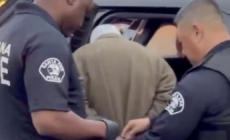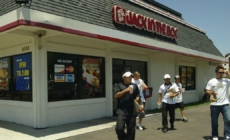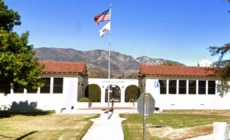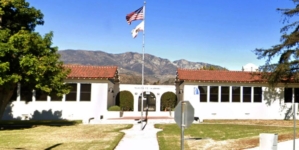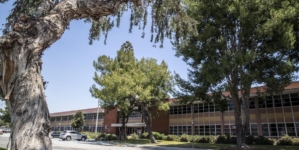-
Hearts Melt Over How Goldendoodle With the ‘Color Fading Gene’ Changes - 12 mins ago
-
Newsom says soliciting older minors should be a felony in California - 27 mins ago
-
Diamondbacks vs. Mets Highlights | MLB on FOX - 31 mins ago
-
Cleveland Browns could make shocking Shedeur Sanders decision before 2025 season - 52 mins ago
-
Instagram uses AI to crack down on teens posing as adults online - 54 mins ago
-
Protest near home of suspect in serial cat killings leads to vandalism - about 1 hour ago
-
Kentucky Derby Betting for Beginners | Bear Bets - about 1 hour ago
-
Lindsey Graham Backs Trump to Be the Next Pope: ‘Trump MMXXVIII!’ - 2 hours ago
-
Jack in the Box is closing up to 200 underperforming locations - 2 hours ago
-
School counselor charged with molesting children sees more accusers - 2 hours ago
Judge orders Border Patrol to halt illegal stops in the Central Valley
A federal judge ordered the U.S. Border Patrol to halt illegal stops and warrantless arrests in the Central Valley after agents detained and arrested dozens of farmworkers and laborers — including a U.S. citizen — this year.
The days-long raid around Bakersfield sparked outrage after video circulated of agents slashing the tires of a gardener who was a citizen on his way to work, and raised fears those tactics could become the new norm in the largely agricultural area.
Jennifer Thurston, a U.S. District Court for the Eastern District of California, said in an 88-page order that evidence presented by ACLU lawyers established “a pattern and practice” of violating people’s constitutional rights when detaining people without reasonable suspicion. And then violating federal law by executing warrantless arrests without determining flight risk.
“The evidence before the Court is that Border Patrol agents under DHS authority engaged in conduct that violated well-established constitutional rights,” she wrote.
Thurston’s ruling allows the ACLU to bring a class action lawsuit against the government for the raids. It also requires the Border Patrol to submit detailed documentation of any stops or warrantless arrests in the Central Valley, and show clear guidance and training for agents on the law.
“This sends a powerful message that the raids Border Patrol conducted in and around Kern County in January were illegal,” said Bree Bernwanger, an attorney at ACLU Foundation of Northern California. “You cannot be pulled over and grabbed on the street because of the color of your skin. Border Patrol is going to be held accountable for those practices and for violating people’s rights.”
Government lawyers in a court hearing on Monday did not dispute the accounts of individuals arrested and detained in the raid, but had asked the court to throw out the case, saying it lacked jurisdiction and argued the raid did not constitute systemic behavior.
“Those are disparate examples,” Olga Y. Kuchins, an attorney with the Department of Justice, argued before the court.
But a skeptical Thurston asked for evidence to prove that, in a pointed back and forth during the hearing.
“Two days does not establish a pattern or practice,” she said, suggesting that it was the actions of a few agents.
Thurston then asked the basis for that finding. Kuchins said she had none.
“I’m bound by the evidence that I have,” Thurston concluded at the end of arguments.
The early January enforcement actions involved about 60 agents from El Centro Sector, based in the Imperial Valley, near the U.S. Mexican border.
For “Operation Return to Sender,” agents traveled about 300 miles to Bakersfield, where the ACLU argues they targeted brown-skinned residents driving along Highway 99, and at local filling stations and a Home Depot — stopping them without establishing probable cause.
At the time, U.S. border agents said the operation was aimed at dismantling transnational criminal organizations. U.S. Border Patrol Chief Agent Gregory K. Bovino posted on social media that agents detained two child rapists and “other criminals,” and retrieved 36 pounds of narcotics.
But CalMatters later reported that data from the agency showed it had no prior knowledge of criminal or immigration history for 77 of the 78 people arrested.
Wilder Munguia Esquivel, who was arrested at Home Depot according to court documents. He was standing outside the store when 10 unidentified agents in masks aggressively swarmed the day laborers gathered there and began to ask if they had papers and identifications. Esquivel had a pending petition and lived with his family, who are U.S. citizens.
When he stayed silent and walked away, an agent ordered him to turn around and handcuffed him, then yanked his wallet from his back pocket. He was arrested and sent to detention near the border, before being released three days later.
After the lawsuit was filed, Border Patrol issued notice to their agents about how to make a warrantless arrest and identify themselves as agents during arrests. But the ACLU argued the policy was not enough to prevent them from repeating the same behavior.
Last week, U.S. Customs and Border Protection executed a raid at a Home Depot in Pomona where officials say 10 people were arrested by agents who arrived in unmarked vehicles.
Source link





